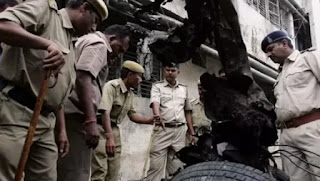Ahmedabad blasts Ahmedabad court sentences 38 accused to death 11 to life imprisonment
A court in India has sentenced 38 people to death in connection with a series of bomb blasts in Ahmedabad 14 years ago.
 |
| Ahmedabad blasts: Ahmedabad court sentences 38 accused to death, 11 to life imprisonment |
A bomb blast near the Indian state of Gujarat has killed at least 57 people & injured hundreds more.
A local court in Ahmedabad has also sentenced 11 accused to life imprisonment in the case & all the convicts have the right to appeal against their sentences.
The court acquitted 28 accused named in the case.
A total of 78 people were prosecuted in connection with the blasts, one of whom, Ayaz Saeed, later assisted investigators.
Special Judge AR Patel who heard the case also ordered the authorities to pay Rs 1 lakh each to the families of the victims.
On July 26 2008 in a single hour, 20 bombs exploded in different parts of Ahmedabad, some in residential areas & some near bazaars ,,& hospitals.
In addition to the blasts police later discovered several more bombs that did not explode.
What is an organization called Indian Mujahideen?
The militant group Indian Mujahideen claimed responsibility for the blasts in an email to the media. It was an anonymous organization with little information at the time.
Also Reat It :
Sohail Shaheen: The Taliban have the right to speak out in favor of Muslims anywhere, including Kashmir
India is carrying out terrorism in Pakistan, we have irrefutable evidence: Pakistan
The story of US pressure to shut down Pakistan's nuclear program has been leaked to secret documents
The Indian Mujahideen had claimed responsibility for several major bombings in India, but it came to light after the September 2008 Delhi bombings.
The group also claimed responsibility for a series of bombings in Ahmedabad in 2008 and an attack on a German bakery in Pune in 2010.
The group was banned by the Indian government in 2010 after the Pune attack while the United States added the Indian Mujahideen to its list of global terrorist organizations in 2011.
A statement issued by the US administration at the time stated that the organization had close ties to a number of banned terrorist organizations operating in Pakistan, including Lashkar-e-Taiba, Jaish-e-Muhammad and Harkat-e-Jihad-e-Islami.
U.S. officials say the group has been involved in dozens of bombings in India since 2005, killing hundreds.
The statement also said that the aim of the Indian Mujahideen was to carry out acts of terrorism against non-Muslims so that they could achieve their goal of establishing an Islamic caliphate in the whole of South Asia.




0 Comments